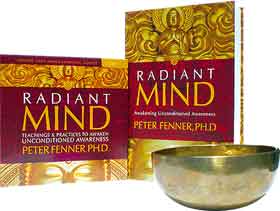Experientializing the space of nondual awareness
This might sound like a positive thing to happen, but it’s not. Here I am talking about how to recognize the process of making “nothing” into something, thereby losing the connection with the nondual. We know that nondual awareness isn’t an experience. It’s not a thought. It’s not a sensation or feeling. Still people have a tendency to experientialize it, i.e. to make it (the nothing) into something. This is because we normally share through our experiences. It’s also the way we remember things.
We see this very clearly when people talk about an awakening experience. People will say, “I was on a retreat, and I had an awakening. The self dropped away, everything changed and became luminous.” Two things are possible here. They’re either describing a change at the conditioned level (which was great) or they’re describing an awakening into nondual awareness that they’ve subsequently experientialized. They’re sharing it with us as something that “happened.” They’re talking in the past tense about an event. If someone is talking about an awakening that happened last year, or ten years ago, as a significant event, they’re not abiding in awareness. We can’t remember nondual awareness because there’s nothing to recall!
In nondual awareness nothing happens. There’s not even any awakening because there’s no medium within which the awakening can occur. There’s no before or after. People degrade the nondual space by talking about some of the experiences that may have or often do accompany that state. And then they confound these with awareness itself.
People might speak of feeling really serene, that everyone is divine in their own unique way, or that everything is totally perfect. In a workshop setting, people can be in a state of pure awareness in which nothing is happening and then after some time, they want something to be happening, rather than just continue to abide in the no-thing that’s happening. So people will introduce concepts, like appreciating the love, the intimacy, or the feeling of connection that’s happening. They are taking something that’s not an experience and making it into one. These are some of the ways that people experientialize the state.
The moment that “this” is spoken about as something that’s happening, as a process or an event, or as anything that involves a feeling, or change in thought, “this”—as contentless awareness—has been experientialized. We no longer have “this.”
The experientialization of awareness can also happen when people are reporting a present-time state. For example, they may be talking about something that’s happening for them in the moment we are listening to them. They may be telling us that they are awake right now, or abiding as awareness. In this case we listen to ascertain if this is happening to them or for them. Is there an “assumed I,” a presumed experiencer? If there is, there must be something to experience. If there’s nothing to experience, there’s no experiencer. So we listen to see if they are revealing the nothing that’s happening to no-one.
In this space, nothing’s happening. It’s completely uneventful. If someone is in the fruition state, abiding in awareness at the moment, a so-called awakening experience is irrelevant, it’s not even surfacing, because we’re in a state where there’s no where further to go, and there’s no need to talk about it. It’s a non-event. They can see that it didn’t in fact happen. In just the same way that nothing’s happening now.
This is why the Heart Sutra says, “There is no liberation.” When we’re in the fruition state, abiding in awareness, there is no liberation. This is not a state of liberation. There’s no freedom here. There’s no “awakening” into this state. This is ordinary mind, our natural condition.
Sometimes when people begin to share experiences of awakening that have happened to them, I warn them. I say, “Look, if you’re going to share this with me, I will engage with you in a way that your experience will be deinvested of all the value that you’ve built into it. I’m going to ask you exactly what happened, and you’re not going to be able to tell me. You’re not going to be able to find it. Or what you find will just be the pleasant attractive accoutrements that accompany the presencing of pure awareness, not awareness itself. The good news is that our inquiry will lead us straight back into the awakening you are talking about.”
Extracted from Natural Awakening: An Advanced Guide to Sharing Nondual Awareness



